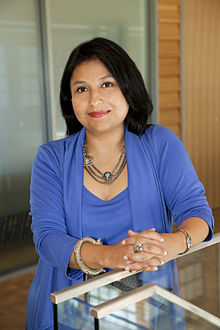Ananya Roy
Ananya Roy (* 1970 in Calcutta ) is a professor of urban planning , social welfare and geography and director of the Institute on Inequality and Democracy at the UCLA Luskin School of Public Affairs. She researches and teaches mainly on the topics of poverty and inequality and has published articles and books on this.
Life and work
Roy grew up in Calcutta as the daughter of a teacher and a businessman. From 1992 she studied urban and regional planning at the University of California, Berkeley . In 1999 she did her doctorate there. She then taught and researched in various areas in Berkeley and was a professor in the University's Department of City and Regional Planning from 2009. In addition to other academic activities, from 2007 she worked as Education Director in the management of the Blum Center for Developing Economies, a think tank supported by the US Agency for Development Cooperation (USAID) .
Together with colleagues from the University of California, she campaigned for a functioning public education system in 2009. In the same year, 700 students registered for their course on global poverty, 300 more applicants could not be admitted.
Roy was later appointed Professor of Urban Planning and Social Welfare at UCLA Luskin School of Public Affairs. Since 2015 she has held the Meyer and Renee Luskin Chair for Inequality and Democracy and is founding director of the Institute on Inequality and Democracy at UCLA. The institute researches social inequality worldwide, working with social movements and activists .
Roy teaches a. a. on the theory and history of urban development and planning and on topics relating to research on poverty and development.
Her research deals with the topics of poverty and inequality in order to strengthen socially marginalized groups. Roy's work often addresses ethnically motivated displacement or the displacement of the working class from cities like Los Angeles to the remote fringes of urban life.
Roy is committed to post-colonial criticism, feminism and critical race studies . Roy's goal is to change Eurocentric perspectives with her work and to promote sensitivity to historical differences in research and teaching.
She publishes books and articles and is the editor of the International Journal of Urban and Regional Research. Together with her UCLA colleague Clare Talwalker, she founded the book series Poverty, Interrupted, which is published by the University of California Press . She is also experimenting with digital and social media and exploring the question of how academics can better communicate with the public in the future.
Awards
- Distinguished Teaching Award , UC Berkeley, 2006
- Excellence in Achievement Award from the Cal Alumni Association, 2011
- Paul Davidoff Book Award of the Association of Collegiate Schools of Planning , 2011
Publications (selection)
- City Requiem, Calcutta: Gender and the Politics of Poverty . University of Minnesota Press, Minneapolis 2002, ISBN 978-0-8166-3933-5
- Urban Informality: Transnational Perspectives from the Middle East, South Asia, and Latin America. Edited with Nezar AlSayyad. Lexington Books, Lanham 2003, ISBN 978-0-7391-0740-9
- The Practice of International Health. Edited with Daniel Perlman. Oxford University Press, New York 2009, ISBN 978-0-19-531027-6
- Poverty Capital: Microfinance and the Making of Development . Routledge, Abingdon 2010, ISBN 978-0415876728
- Worlding Cities: Asian Experiments and the Art of Being Global . Edited with Aihwa Ong . Wiley-Blackwell, Hoboken 2011, ISBN 978-1-4051-9277-4
- Territories of Poverty: Rethinking North and South. Edited with Emma Shaw Crane. University of Georgia Press, Athens 2015, ISBN 978-0-8203-4842-1
- Encountering Poverty: Thinking and Acting in an Unequal World. Edited with Genevieve Negrón-Gonzales, Kweku Opoku-Agyemang, Clare Talwalker. University of California Press, Berkeley 2016, ISBN 978-0-520-27790-8
Individual evidence
- ^ Prof. Ananya Roy: Territories of Poverty: Urban Informality in a Rearranged South-North World. In: Master of International Cooperation Sustainable Emergency Architecture. Retrieved January 1, 2020 (American English).
- ↑ a b Ananya Roy: Housing justice in cities with unequal living conditions. In: goethe.de. Goethe-Institut, accessed on January 5, 2020 .
- ↑ a b c d Les Dunseith: Ananya Roy. In: luskin.ucla.edu. UCLA Luskin School of Public Affairs, accessed January 1, 2020 (American English).
- ^ A b Tad Friend: Protest Studies. In: The New Yorker. Condé Nast, December 27, 2009, accessed January 6, 2020 .
- ↑ a b Monika Grubbauer: Ananya Roy: Slumdog Cities: Rethinking Subaltern Urbanism. In: Springer Link. Springer Nature Switzerland AG, August 13, 2016, accessed on December 5, 2020 .
- ↑ Joe Luk: Ananya Roy to direct new UCLA Luskin Institute on Inequality and Democracy. In: UCLA Luskin School of Public Affairs. December 15, 2014, accessed January 6, 2020 (American English).
- ^ Oscar Perry Abello: UCLA Institute to Focus on Activists Tackling Inequality. In: Next City. February 5, 2016, accessed January 6, 2019 .
- ^ About the Institute. In: The Institute on Inequality and Democracy at UCLA Luskin. Retrieved January 6, 2020 (American English).
- ↑ Distinguished Teaching Awards announced. In: UC Berkeley. April 25, 2006, accessed January 6, 2020 .
- ^ Poverty Capital: Microfinance and the Making of Development. In: CRC Press. Taylor & Francis Group, accessed January 6, 2020 .
Web links
| personal data | |
|---|---|
| SURNAME | Roy, Ananya |
| BRIEF DESCRIPTION | Indian scientist |
| DATE OF BIRTH | 1970 |
| PLACE OF BIRTH | Calcutta |
